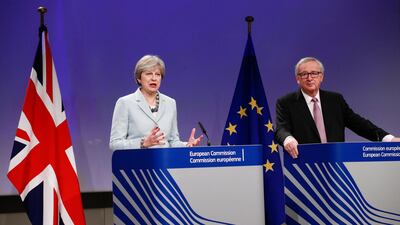Negotiators have broken months of deadlock over the terms of Britain’s departure from the European Union clearing the way for trade talks between the two sides, officials announced early Friday.
The European Commission President Jean-Claude Juncker announced the deal early Friday after the final hurdle on the state of the Irish border was removed during a series of phone calls that went into the early hours.
The deal - enshrined in a 15-page document - follows a week of frantic negotiations after an announcement on an anticipated deal was scrapped amid chaos on Monday following disagreements within the UK government over the border issue.
“Prime Minister [Theresa] May has assured me that it has the backing of the UK government. On that basis I believe we have made the breakthrough we needed,” said European Commission President Jean-Claude Juncker.
Mrs May – who flew to Brussels early Friday to announce the deal – said that the talks had delivered “a hard-won agreement in all our interests”.
The deal represents the conclusion of only the first stage of the talks with months of difficult negotiations still to come before Britain leaves the trading bloc in March 2019.
The deal means that three key issues have been largely resolved: the question of how much the UK will pay to settle its commitments, the fate of EU citizens living in the UK and the border issue.
The settlement was estimated by senior British officials at £35-£39 billion, less than figures mooted over the last month but still disappointed hardline pro-Brexit campaigners who said that Britain should pay nothing.
Mrs May secured the agreement of both the Irish prime minister and members of her own government during a series of phone calls from Downing Street.
Mrs May’s government is propped up by the support of a Northern Irish party. It had scuppered last week’s talks because of concerns that any deal would lead to a weakening of the link between Northern Ireland andthe rest of the UK.
The leader of the Democratic Unionist Party (DUP), Arlene Foster, said there had been substantive changes from the deal over the course of the week.
“We’re pleased to see those changes. For me it means there’s no red line down the Irish Sea,” she said.
“We have the very clear confirmation that the entirety of the UK is leaving the European Union, the single market and the customs union. That’s a very important statement to have.”
The government of EU-member the Republic of Ireland had expressed concerns that any deal would lead to a return of checkpoints and a so-called hard border that were swept away by a 1998 agreement that ended three-decades of conflict over the state of the island.
“We will guarantee there will be no hard border,” Mrs May said. “We have taken this week to strengthen and clarify this part of the agreement.”
The securing of the deal will be a huge relief to the prime minister who faced anger from her own lawmakers following Monday's fiasco. It followed her disastrous decision to call national elections earlier this year, which left her in a weakened position and dependent on the votes of the DUP to survive.
Signs that the announcement was imminent came as Downing Street confirmed that Mrs May had flown to Brussels. Martin Selmayr, the chief of staff of Mr Juncker, tweeted an image of rising white smoke – the sign that a new pope had been chosen – to indicate that a deal had been done.
Mr Juncker said that the decision on whether to move forward to talks on trade and the transition to a post-Brexit relationship was in the hands of the leaders of the 27 other EU nations, meeting in Brussels at a European Council summit on Thursday, but said he was "confident" they would do so.
The Commission president said: "I will always be sad about this development, but now we must start looking to the future, a future in which the UK will remain a close friend and ally.”
UK businesses welcomed the agreement after high-profile companies had warned they could trigger plans to move staff out of the UK if no progress had been made by the end of the year. The pound rose on the news of the deal.
_____________
Read more:
Theresa May in desperate fight to rescue crumbling Brexit deal after Ireland row
The Irish border dispute that threatens to derail Brexit
UK House of Lords releases damning report on Brexit
______________
The deal was welcomed by senior Cabinet members who promoted Brexit in the run-up to the 2016 referendum, was described as a betrayal by senior members of the campaign to leave the European Union.
Arron Banks, the millionaire founder of the Leave.EU campaign, said the agreement had been forged by a "traitorous, lily-livered embarrassment of a prime minister".


